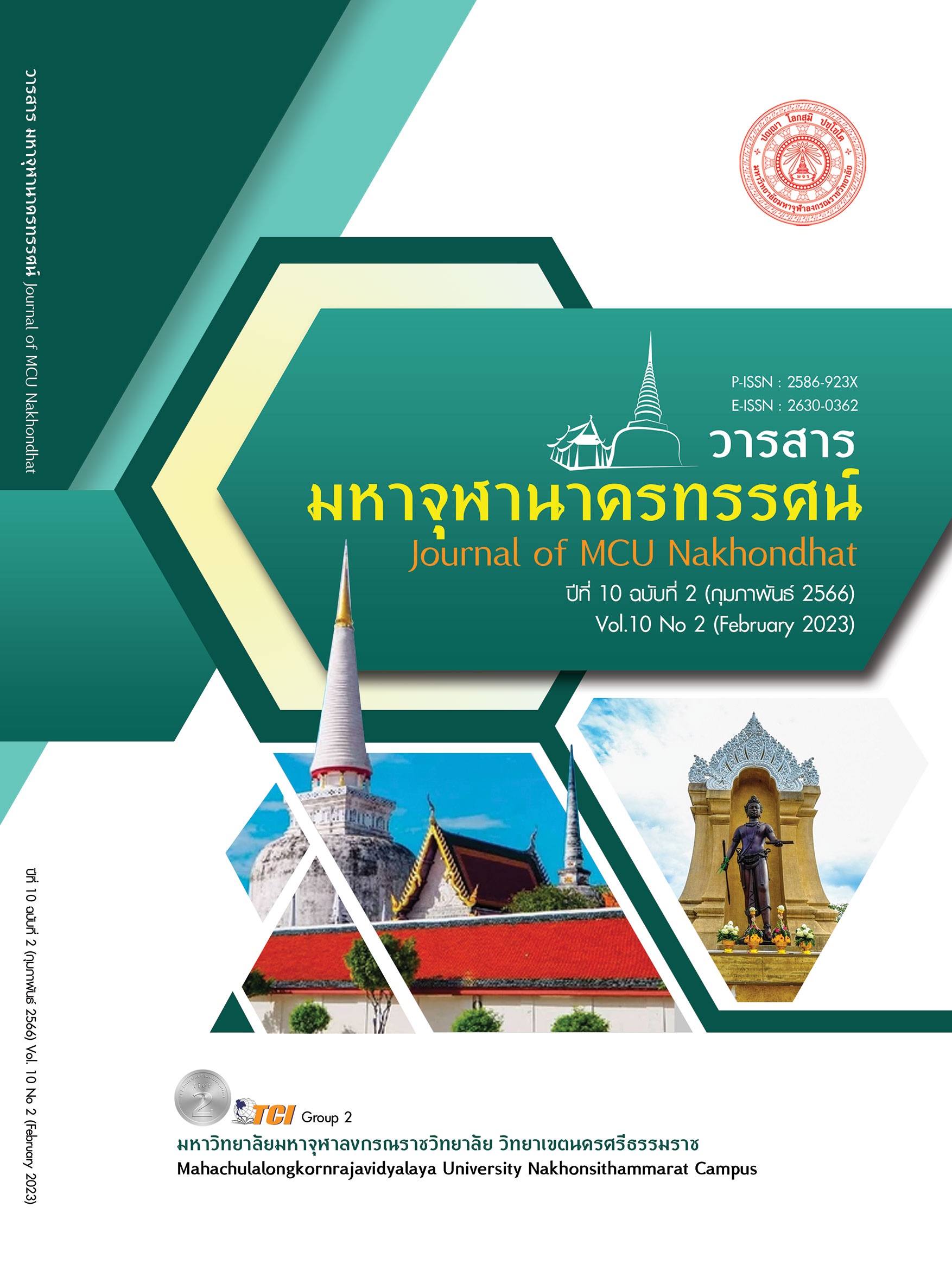BRAHMA VIHARA 4: WITH PERSONNEL MANAGEMENT IN THE ORGANIZATION
Main Article Content
Abstract
Personnel management is a very important function in an organization. Because people are the whole of complexity, executives must use science as knowledge. And art is skill or art in relation to people in various fields. Therefore, "executives" who must take care of the suffering and happiness of personnel in the organization must have Brahmavihara 4, which are 1) Metta is the desire for others to be happy. Executives should be kind to everyone and encourage people to be happy. 2) Karuna, the desire for others to be free from suffering. When subordinates face difficulties, executives should provide encouragement, help and inspiration. 3) Mudita, the joy when others do well. When subordinates succeed in their work the boss should give sincere congratulations. 4) Upekkha: Good intentions have limits and are based on justice. It can be seen that these Brahmavihara 4 principles cover every situation that may occur and can be applied to practically everything in life. It's not just about work and not limited to the person who is the boss but people who are subordinates can use this principle in their lives as well if both parties live together with good wishes to each other. Executives, in addition to having knowledge, competence and skills in management still have to be a virtuous person in mind and have ethical beliefs. It is an important feature that will enhance the executives to be able to manage the organization effectively according to dominance which is the principle that makes the follower to be noble. This results in everyone in society being able to live together happily.
Article Details

This work is licensed under a Creative Commons Attribution-NonCommercial-NoDerivatives 4.0 International License.
References
จงศักดิ์ ผดุงทรัพย์. (2551). กลไกการบริหารทรัพยามนุษย์ของตุลาการ. ใน ดุษฎีนิพนธ์รัฐประสาสน ศาสตรมหาบัณฑิต สาขารัฐประสาสนศาสตร์. มหาวิทยาลัยเชียงใหม่.
พระพรหมคุณาภรณ์(ป.อ.ปยุตฺโต). (2546). พจนานุกรมพุทธศาสตร์ฉบับประมวลธรรม พิมพ์ครั้งที่ 12. กรุงเทพมหานคร: บริษัทสหธรรมิกจำกัด.
พลเดช นามวงศ์. (2564). การบริหารโดยวัตถุประสงค์. เรียกใช้เมื่อ 19 เมษายน 2564 จาก http://www.gotoknow.org/posts/340024
พิชัย เสงี่ยมจิตต์. (2542). การบริหารสถานบันเพื่อความป็นเลิศ. เมือง: สถาบันราชภัฏอุบลราชธานี.
วินัย ภูมิสุข, ณัฎกานต์ หงษ์กุลเศรษฐ์. (2562). การบริหารทรัพยากรมนุษย์ตามหลักพรหมวิหาร. วารสารบัณฑิตศึกษาปริทรรศน์, 7(3),457-465 .
สมเกียรติ.พ่วงรอด. (2544). การบริหารงานบุคคล. ปัตตานี: มหาวิทยาลัยสงขลานครินทร์.
สมคิด บางโม. (2546). องค์การและการจัดการ. กรุงเทพมหานคร: วิทยพัฒน์.
สมเด็จพระญาณสังวร เจริญ.สุวฑฺฒโน). (2543). รวมธรรมะ. กรุงเทพมหานคร: อมรินทร์พริ้นติ้งแอนด์พับลิชชิ่ง.
สมพงษ์. เกษมสิน. (2556). การบริหารงานบุคคลแผนใหม่, พิมพ์ครั้งที่ ๕,. กรุงเทพมหานคร: ไทยวัฒนาพานิช.
เสกมนต์.สัมมาเพ็ชร์. (2559). ทรัพยากรการบริหารกับประสิทธิผลการปฏิบัติงานของเจ้าหน้าที่ทัณฑสถานบําบัดพิเศษกลาง กรุงเทพมหานคร. ใน ดุษฎีนิพนธ์รัฐประศาสนศาสตรมหาบัณฑิต สาขาวิชารัฐประศาสนศาสตร. คณะศิลปศาสตร์ มหาวิทยาลัยเกริก.
อำนวย.แสงสว่าง. (2544). การจัดการทรัพยากรมนุษย์. กรุงเทพมหานคร: อักษรพิพัฒน์การพิมพ์.


